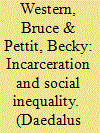| Srl | Item |
| 1 |
ID:
097859


|
|
|
| 2 |
ID:
098174


|
|
|
| 3 |
ID:
141307


|
|
|
|
|
| Summary/Abstract |
In the last decades, the American state has radically enlarged the array of policy instruments utilized in today’s governance of the poor. Most recently, through a process of outright “seizure,” the state now exacts revenue from low-income families, partners, and friends of those individuals who in very large numbers cycle in and out of the nation’s courts, jails, and prisons. In an analysis of legislation, judicial cases, policy regulations, blog, chat-line postings, and survey data, we explore this new form of taxation. In doing so, we endeavor to meet two objectives: The first is to document policies which pressure individuals (mostly men) entangled in the court and prison systems to rely on family members and others (mostly women) who serve as the safety net of last resort. Our second objective is to give voice to an argument not yet well explored in the sizeable incarceration literature: that the government is seizing resources from low-income families to help finance the state’s own coffers, including the institutions of the carceral state itself. Until now, no form of poverty governance has been depicted as so baldly drawing on family financial support under the pressure of punishment to extract cash resources from the poor. This practice of seizure constitutes the very inversion of welfare for the poor. Instead of serving as a source of support and protection for poor families, the state saps resources from indigent families of loved ones in the criminal justice system in order to fund the state’s project of poverty governance.
|
|
|
|
|
|
|
|
|
|
|
|
|
|
|
|